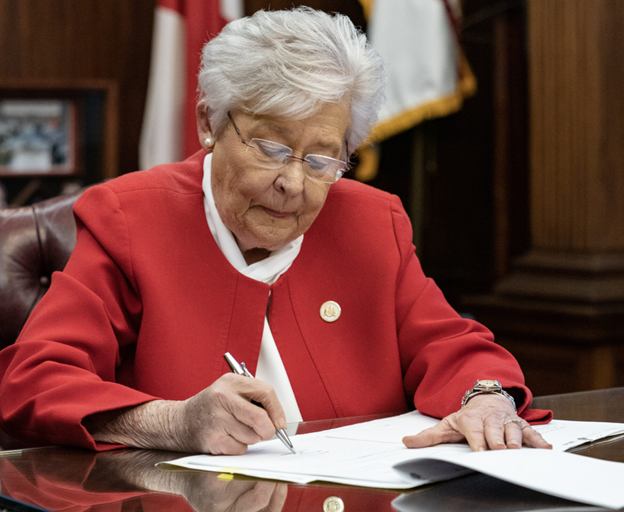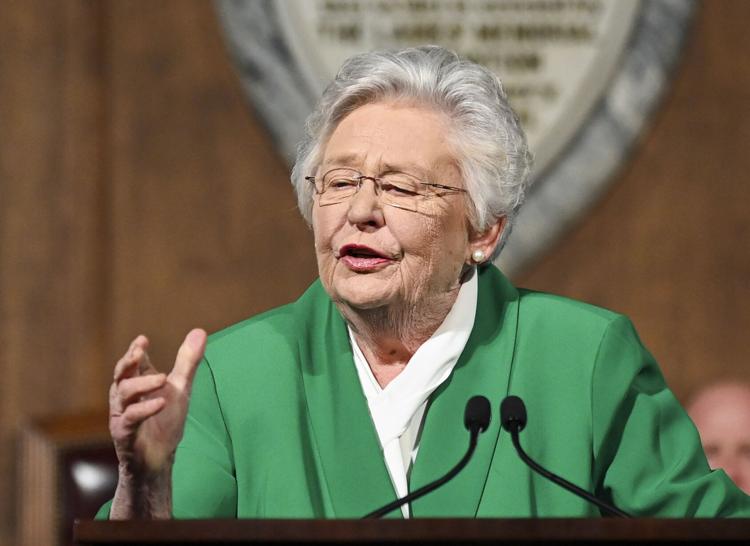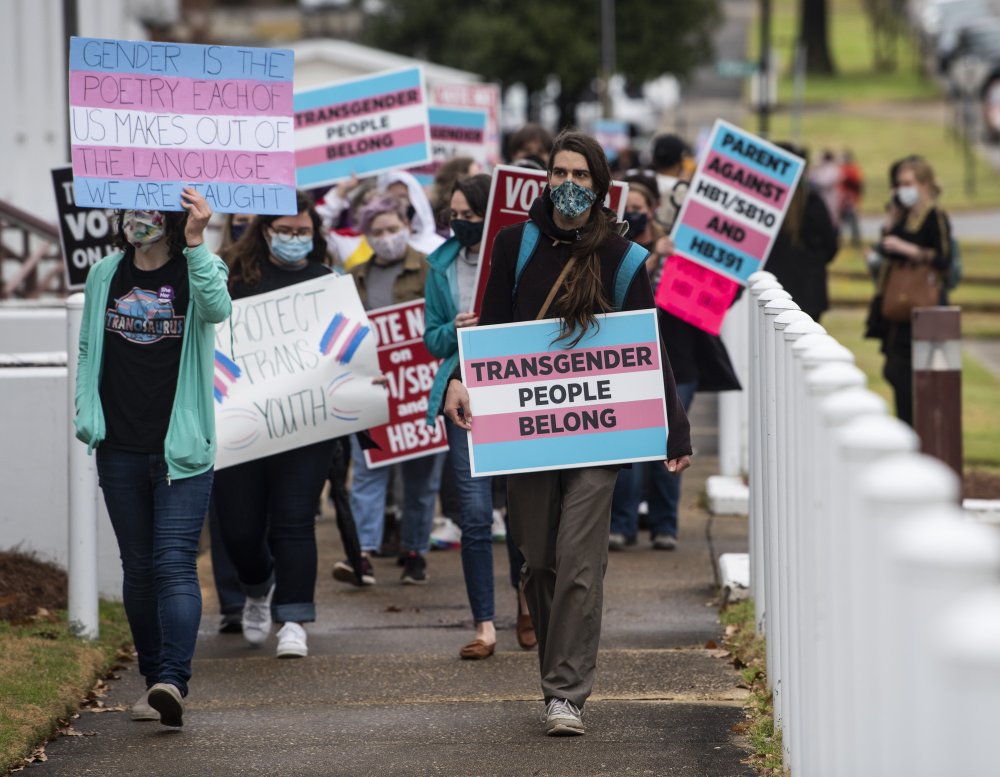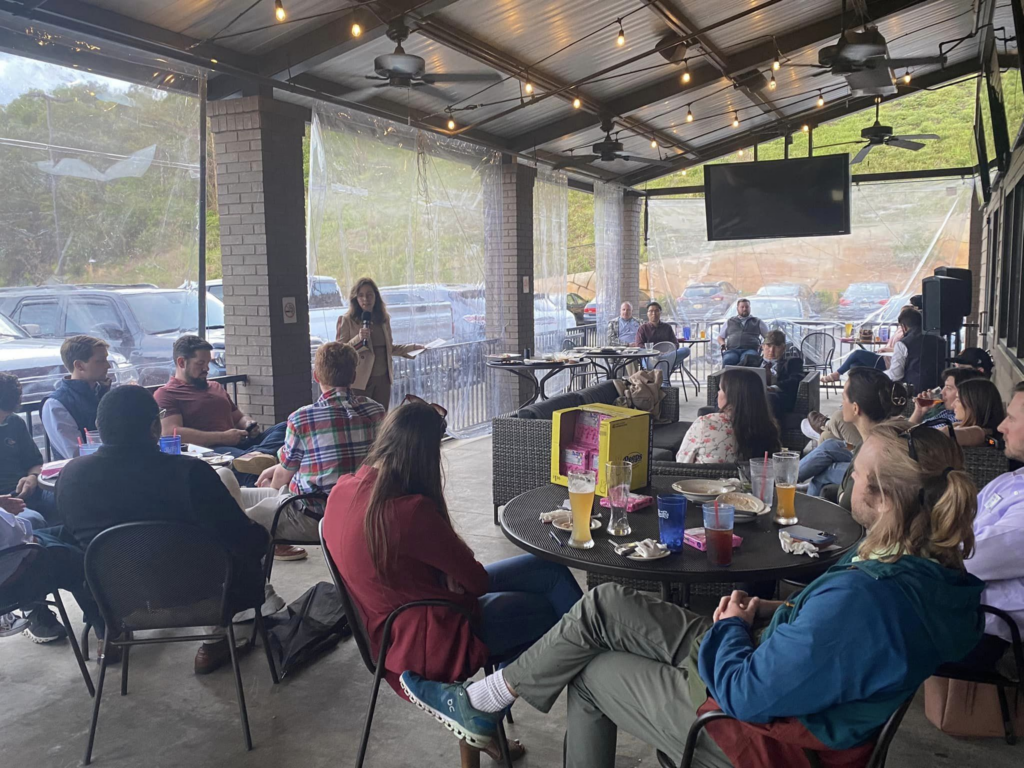Stephanie Smith addresses Young Republicans

On Wednesday, Stephanie Smith addressed a joint meeting of the Shelby, Jefferson, and St. Clair County Young Republican Clubs. The three groups of YRs were gathered at Hoover Tactical Firearms to watch Wednesday night’s Republican Party Presidential Debate. Smith is the third president of the Alabama Policy Institute (API). Smith said API was founded in 1989 by Gary Palmer and Tom Parker. Palmer served as President until he ran for Congress in Alabama’s Sixth Congressional District – a position he still holds. Caleb Crosby led the group for about eight years until being replaced by Smith in January. “The Alabama Policy Institute has gone through some transition over the last nine years,” said Smith. “We try to strike a balance between the social conservative side and fiscal conservative side,” Smith said. “We try to set a conservative agenda for the state,” Smith explained. “To hold elected officials accountable for their vote.” “We opine on national issues with our congressional delegation, but we are more focused on state issues,” Smith continued. She went on to explain to the YRs how to watch the debate. “Try to focus on the issues rather than the personality,” Smith said. “With Trump not being here, they are going to try to jockey for that second spot.” She handed out sheets and asked the group to rank the candidates on the issues and how close they came to their views without the bias of how they felt about the candidates before the debate. “It has been interesting to me since I took over API in January,” Smith said. “I have had national officials come up to me and ask, why are you here? Alabama is great. You have a supermajority. You can pass whatever you want.” “Many of the men and women in leadership are more moderate,” Smith explained of state government. “They are not as conservative on the Alabama side.” “There are plenty of things we can do to be more conservative as a state,” Smith said. “We are nonpartisan, but we are conservative-led.” She said that one thing that API does is “push out as much information as we can.” State Representative Susan Dubose (R-Greystone) said, “I cannot tell you how beneficial Stephanie and her group have been to me.” Dubose said that the information that she gets from API is trustworthy. “It is actual fact. It is not something that they made up,” Dubose said. The YRs then watched the over two-hour debate. Former President Donald Trump elected not to participate in the debate. Also at Wednesday night’s event was former State Senator Bryan Taylor, who is running for Chief Justice of the Alabama Supreme Court, and Alabama Court of Civil Appeals Judge Matt Fridy. Before Smith’s presentation, the Shelby County Young Republicans elected their officers. Shane Plyler was elected the group’s chairman. River Morris was elected Vice Chair. St. Clair County Republican Party Chairman Logan Glass announced that the club is raffling off a customized AR-15 built by one of the club’s members. Tickets are $5 each. The Alabama presidential primary is on Tuesday, March 5. To connect with the author of this story or to comment, email brandonmreporter@gmail.com.
Gov. Kay Ivey signs alternative teacher certification legislation

On Monday, Alabama Governor Kay Ivey signed legislation to expand alternative pathways for teacher certification. Sponsors hope that the move will allow the state to better address its chronic teacher shortage. House Bill 342 (HB342) was sponsored by State Rep. Susan Dubose (R-Greystone). HB342 expands access to high-quality alternative certification pathways for new Alabama teachers in order to address ongoing teacher shortages. Governor Ivey said that the new teacher alternative certification pathways comply with the state’s rigorous standards. “As Alabama continues to face teacher shortages, particularly in math and science, efforts are being undertaken to fill vacancies in those positions with qualified persons with academic experience outside the teaching profession. One such approach, HB 342, expands access to high-quality alternative certification pathways for new teachers that comply with rigorous standards, while also maintaining the professionalism and quality of the teaching profession,” said Ivey. The legislation states, “The State of Alabama shall modify its policies relative to the certification of teachers to permit the issuance of a professional educator certificate to those qualified individuals who successfully complete an approved alternative teacher preparation program. In addition to any provisional certificates and professional certificates issued pursuant to this chapter to individuals graduating from approved teacher education programs, the State Board of Education shall authorize the issuance of a professional educator certificate by the State Superintendent of Education to a qualified individual who completes an approved alternative teacher preparation program.” The legislation also states, “The State Superintendent of Education shall maintain a database of alternative teacher education preparation organizations, approved by the State Board of Education, as a means for screening, recruiting, and recommending for certification qualified individuals to teach in the public K-12 schools.” An approved alternative teacher education preparation organization shall require each applicant to hold a bachelor’s degree from an accredited institution of higher education that offers, at minimum junior and senior-level courses of instruction. Applicants must also successfully pass a criminal history background information check, successfully complete an alternative teacher preparation program offered by the approved organization. According to the most recent numbers available, over 18% of certified teachers nationally earned their teaching certificate through alternative teacher education preparation organizations. The legislature also passed a 2 percent pay raise for teachers on top of their already scheduled step pay increases. The 2023 Alabama Regular Legislative Session ended on Tuesday. To connect with the author of this story or to comment, email brandonmreporter@gmail.com.
Kay Ivey signs bill to ban biological males from women’s college teams

Alabama Gov. Kay Ivey signed into law a bill on Tuesday that requires transgender athletes at the state’s universities and community colleges to compete on teams based on their birth sex. House Bill 261 was sponsored by Rep. Susan DuBose, R-Hoover, and also prevents governmental entities, licensing, accreditation organizations, or athletic associations from filing a complaint, opening an investigation, or any other adverse action against a school that follows state law. It also gives those who say they are deprived of an athletic opportunity because a school is in violation of the law the ability to take the institution to court. “Look, if you are a biological male, you are not going to be competing in women’s and girls’ sports in Alabama,” Ivey said in a news release touting her signing of the bill. “It’s about fairness, plain and simple.” In 2021, she signed into law a bill that banned males from competing in girls’ sports in K-12. She also signed a letter earlier this month with 24 other Republican governors asking the Biden administration to stop its intent to expand Title IX protections to transgender athletes. Twenty-one states prohibit transgender students from participating on sports teams that do not align with their biological sex at birth, according to the Movement Advancement Project that tracks state policies. Republished with the permission of The Center Square.
Alabama lawmakers attempt to define ‘what is a woman’

Alabama lawmakers on Wednesday advanced legislation that would define who is recognized as female and male under state law. The House Health Committee voted along party lines to approve the “What is a Woman Act” and send the legislation to the full House of Representatives. The bill is similar to measures introduced in several GOP-controlled states and would base the definitions off a person’s reproductive systems. Republican Rep. Susan Dubose, the bill’s sponsor, argued the definitions are needed to protect “women’s spaces” such as dorm rooms. She said the words male and female appear frequently in law without being defined. “Activists have sought to redefine these words and separate sex from biology,” Dubose said when she introduced the bill last week. The bill defines a female and woman as an “individual whose biological reproductive system is designed to produce ova” and a male and man as an “individual whose biological reproductive system is designed to fertilize the ova of a female.” The bill states that it is important to “distinguish between the sexes with respect to athletics, prisons or other detention facilities, domestic violence shelters, rape crisis centers, locker rooms, bathrooms,” and other areas. The bill drew heavy opposition during a public hearing last week, where several transgender women called the bill an attack on their assistance. Carmarion D. Anderson-Harvey, Alabama state director Human Rights Campaign, in a statement Wednesday, called the bill the “LGBTQ+ Erasure Act” that “aims to strip away dozens of legal protections and rights for LGBTQ+ Alabamians.” “LGBTQ+ people have spent decades fighting to be equal members of society, but this bill is a slap in the face to all of the progress we’ve made,” said Anderson-Harvey, who is also a trans woman. Republished with the permission of The Associated Press.
Twelve more bills to watch introduced in the legislative session

The 2023 Alabama Regular Legislative Session is almost half over. Tuesday will be legislative day 14. To this point, State Legislators have introduced 618 bills in the current legislative session. Alabama Today has been monitoring bills as they are introduced. Here are twelve of the most recently introduced bills to watch. House Bill 370 (HB370) is sponsored by Representative John Rogers. According to the synopsis, HB370 “would require the Alabama State Law Enforcement Agency to establish and maintain a database that includes a list of individuals with communication disabilities or disabilities that can impair communications, to be available to law enforcement officers. This bill would require the Alabama Department of Public Health to develop a form for individuals to voluntarily register for inclusion in the database.” Senate Bill 237 (SB237) is sponsored by Senator Tom Butler. According to the synopsis, “Under existing law, the Alabama Memorial Preservation Act of 2017 prohibits architecturally significant buildings, memorial buildings, memorial streets, and monuments that are located on public property and have been so situated for 40 or more years from being relocated, removed, altered, renamed, or otherwise disturbed unless the Committee on Alabama Monument Protection grants a waiver, and provides penalties for violations. This bill would require a controlling governmental entity that replaces a memorial building to maintain the original name or erect a marker memorializing the name. This bill would provide that a petition for waiver is deemed denied if the Committee on Alabama Monument Protection fails to act on an application for waiver within 90 days. This bill would revise the penalties for violations and would authorize the Attorney General to commence a civil action. This bill would also require the Alabama State Council on the Arts to oversee the design, construction, and installation of a replica of the Saturn 1B Rocket, previously located at the I-65 Ardmore Welcome Center in Elkmont, Alabama, at the most northern I-65 rest stop in the state.” House Bill 364 (HB364) is sponsored by State Rep. Steve Hurst. HB364 would require a public K-12 school or a local board of education to accept cash and any other form of payment of its choosing for admission to school-sponsored sporting events that are open to the public. Some venues have gone to credit card payments only during the COVID-19 pandemic. House Bill 354 (HB354) is sponsored by State Rep. Mack Butler. HB354 “would provide that classroom instruction or discussions related to gender identity or sexual orientation may not be provided to public school students in kindergarten through eighth grade or to public school students in a manner that is not age or developmentally appropriate. This bill would require the State Board of Education to adopt procedures for notifying a student’s parent if there is a change in the student’s services or monitoring relating to the student’s mental, emotional, or physical health and would prohibit local boards of education from adopting policies to the contrary. This bill would require each local board of education, at the beginning of each school year, to notify parents of the health care services available to students and allow parents to opt their child out of any health care service.” Senate Bill 224 (SB224) is sponsored by Sen. Vivian Figures. According to the synopsis, “Under existing law, the crime of transmitting obscene material to a child by computer is a Class B felony. This bill would clarify that for the purpose of this crime, a child is a person who is under 16 years of age. Under existing law, a person commits the crime of distributing a private image if he or she knowingly posts, emails, texts, transmits, or otherwise distributes a private image with the intent to harass, threaten, coerce, or intimidate the person depicted in certain circumstances. This bill would clarify that a criminal proceeding for a violation of distributing a private image could be brought in any county in which any part of the crime took place, in the county of residence of the victim, or any county where the image was received. Also, under existing law, a violation of incest is a Class C felony. This bill would provide that a violation of incest when the victim is under 16 years of age is a Class A felony. Also, under existing law, a person may not be convicted of the crime of incest or of an attempt to commit incest unless there is corroborated testimony. This bill would remove the requirement of corroborated testimony.” Senate Bill 234 (SB234) is a state constitutional amendment by Sen. Merika Coleman. SB234 would end the state’s four percent sales tax on groceries but would replace the lost revenue by ending the state’s allowing income taxpayers to deduct their federal income tax. A family of four who spends $110 a week on groceries would save $229 on the reduced sales tax on groceries. With a typical household taxable income of $54,062, they pay $4,726 in federal income taxes. Currently, they would deduct that from their state-taxable income. If SB234 passes and they lose that deduction, they would pay $281 in additional Alabama income taxes. In this example, that family would pay $52 more in taxes. A low-income family or a retired couple with no investment income would come out ahead by not having to pay the grocery tax. A high-income family will pay more taxes in this scenario if SB234 becomes law. Senate Bill 232 (SB232) is sponsored by Sen. Chris Elliott. SB232 would authorize peer-to-peer car-sharing programs, which are business platforms that connect vehicle owners with drivers, to enable the sharing of vehicles for financial consideration in this state. House Bill 342 (HB342) is sponsored by Rep. Susan Dubose. The bill states, “Under existing law, the State Superintendent of Education is authorized to issue professional educator certificates to qualified individuals who complete an alternative teacher preparation program offered by an approved alternative teacher education preparation organization. This bill would provide additional requirements for programs to provide alternative certifications for educators.” House Bill 339 (HB339) is sponsored by Rep. Chris Pringle. The bill states, “Under existing law, the second or runoff
Alabama House OKs ban on trans athletes at a college level

Transgender women in Alabama would be prohibited from joining female sports teams in college under legislation advanced Tuesday by the Alabama House of Representatives — a part of a wave of restrictions on transgender people being pushed in conservative states. The House voted 83-5 in favor of the legislation that would extend a 2021 ban on transgender athletes in K-12 sports teams to include college teams. The bill states that sports teams “designated for females, women, or girls shall not be open to a biological male.” Similarly, a “biological female” would also not be allowed to participate on teams for boys and men. The legislation now moves to the Alabama Senate. “Forcing women to compete against biological men would reverse decades of progress women have made for equal opportunity in athletics,” Republican Rep. Susan DuBose, the bill’s sponsor, told lawmakers. DuBose said that “no amount of hormone therapy can undo” physical advantages. At least 20 other states have now imposed restrictions on transgender athletes at the K-12 or collegiate level, or both. Supporters said transgender women have an unfair advantage in competition, while opponents argue the bills are rooted in discrimination and fear. “This is discriminatory, and it is unnecessary. States and university sports leagues already have their own governing bodies to determine the best regulations that work for their students,” Carmarion D. Anderson-Harvey, state director for the Human Rights Campaign, said in a statement. The Human Rights Campaign is an advocacy group for LGTQ+ individuals. Rep. Chris England, a Democrat from Tuscaloosa who voted against the bill, said Republicans are acting like the issue is an “epidemic” problem when they can’t name examples of it happening in the state. “This is just an opportunity for people to create an issue or a solution that is looking for a problem,” England said. And Rep. Roland Hollis, a Democrat from Birmingham, said she thinks there are more important issues for the state to address, such as gun violence rates that rank among the highest in the country. Hollis abstained on the vote, along with 13 other lawmakers. Other Democrats supported the bill, however. “It is just not fair for a man to play against the women,” said Rep. Patrick Sellers, a Democrat from Pleasant Grove. Republished with the permission of The Associated Press.
Legislature to convene Tuesday for fourth week of the session

Both Houses of the Alabama Legislature will meet on Tuesday for the eleventh day of the 2023 Alabama Regular Legislative Session. The Alabama Senate will convene at 2:30 p.m. The Alabama House of Representatives has not posted the start time on the Legislature’s website, but it is probably around 1:00 p.m. The House Tuscaloosa County Legislation Committee will meet Tuesday at 12:45 p.m. in Room 418 of the Statehouse. The committee will consider just one bill. House Bill 275 (HB275) is sponsored by State Representative Ron Bolton. According to the bill, “it would allow the City of Northport in Tuscaloosa County to provide for a warrant recall fee to allow a municipal judge or municipal magistrate for the City of Northport to recall, under certain conditions, a failure to appear warrant.” The Senate County and Municipal Government Committee will meet at 1:00 p.m. in the Senate Finance and Taxation room on the eighth floor of the Alabama Statehouse. Two bills are on the agenda. There is a public hearing scheduled for House Bill 114. HB114 is sponsored by State Representative Debbie Wood. HB114 will allow county governments to claim unclaimed property in their custody faster. Senator Gerald Allen sponsors Senate Bill 169. SB169 would specify that for municipal business taxes purposes, the definition of gross receipts does not include any excise tax imposed by the federal, state, and local governments. Senate Bill 203 (SB203) had been on an earlier version of the Committee agenda but was removed as of press time. SB203 is sponsored by Sen. Jabo Waggoner. SB203 would “authorize any county, municipality, or governmental entity subject to a countywide civil service system to elect by a majority vote of the county or municipal governing body to opt out of the countywide civil service system; to require the county, municipality, or governmental entity to adopt a human resources policy and procedures manual; and to require the county, municipality, or governmental entity to notify the director of the countywide civil service system of its decision to withdraw from the system.” There are over a dozen committee meetings scheduled for Wednesday. Neither the House of Representatives nor the Senate have released a special order calendar as of press time. State Rep. Susan Dubose reported that her legislation (House Bill 261) will be on the House floor on Tuesday. HB261 protects female college athletes from having to compete with biological males in athletics events. The transgender community will likely oppose the bill. It has 39 Republican cosponsors. The regular session is limited by the Alabama Constitution of 1901 to no more than thirty legislative days in a regular session. Tuesday will be the 11th Legislative day. To connect with the author of this story or to comment, email brandonmreporter@gmail.com.
Susan Dubose briefs Birmingham Young Republicans on Legislative session

The Greater Birmingham Young Republicans (GBYR) met on Thursday in Vestavia Hills to hear State Representative Susan Dubose discuss legislation being considered by the Alabama Legislature during the ongoing 2023 Alabama Regular Legislative Session. GBYR President Stephanie Petelos said that Dubose is a first-term member of the Alabama House and is the former head of the North Shelby County Republican Women, which meets monthly to full meetings at a country club. It was announced at the meeting that a Shelby County Young Republicans chapter is being organized. “I am excited about the Shelby County chapter,” Dubose said. “I represent District 45, which includes parts of Jefferson, Shelby, and St. Clair Counties.’ Dubose said the legislation to ban holding a cell phone while driving, essentially requiring hands-free devices, is likely dead for the session. “That was tabled,” Dubose said. “There were problems with that bill. It got too much overreach for me. I don’t think it is coming back.” “I passed my first bill out of committee,” Dubose said. “It is a women’s sports protection bill. It is to protect women college athletes.” “It passed unanimously,” Dubose said. “It (House Bill 261) will be on the House floor on Tuesday.” “April Weaver is running it through the Senate so it could become law,” Dubose said. “The attorney general really wants this passed.” “I am working on an age of majority law,” Dubose said. “14-year-olds are allowed to make medical decisions,” Dubose explained, saying that the age limit should be raised and that parents should be able to have the final say on their children’s medical decisions. “I would like to eliminate the grocery tax,” Dubose said. “Anthony Daniels is for it.” Dubose said, “It is not an exact loss.” Dubose explained that when you give that four percent back to the people, they are going to spend it on other things we collect sales taxes on. “I am a big believer in supply-side economics that Reagan did.” “One of the votes that we had, Vestavia Hills came to our county delegation,” Dubose said. “They wanted to raise their ad valorem taxes by 9.8 mills. They are very proud of their school system there. Many people move to Vestavia for the schools. Our entire Jefferson County Delegation voted yes unanimously.” Dubose told Alabama Today, “Regarding Vestavia Hills, the Vestavia Hills city council unanimously supports letting their residents vote on the 9.8% increase in ad valorem tax. Our Jefferson County House of Representatives delegation voted unanimously by voice vote to move the bill to the floor of the House, where it passed. I believe the people of Vestavia Hills should have a right to vote and make decisions for their own community. Vestavia Hills has a reputation for excellent schools. As a legislative body, we have given the residents the opportunity for a yes or no vote on the property tax increase.” “Another vote where I got real criticism for was the adoption bill,” Dubose said. Dubose said the criticism was for voting down an amendment to the bill that would have blocked any vaccine requirements for adoptive or foster parents. “That should be a personal choice, but that amendment came up at the last minute,” Dubose said. The Senate did add a vaccination amendment when that legislation passed on Thursday. The House will consider Senate changes to the bill as soon as Tuesday. “I do not believe in COVID vaccine mandates at all. That should be a personal choice,” Dubose told Alabama Today. “I voted to table the amendment on the floor because we didn’t have time to research the amendment and vet any unintended consequences. I am happy to hear that the Senate did pass the adoption bill with a slightly different amendment so that an option with exemptions from vaccines will be available for potential parents. I will happily support the adoption bill when it comes back to the House with the vaccine exemption amendment.” “That particular bill was not taking amendments on it at all,’ Dubose explained. “I knew it was going to fail. I try to vote with the Speaker when I can. “ Dubose said the House passed legislation limiting good time incentives for Alabama prisoners. “Bibb County deputy Brad Johnson was shot and killed by a felon who had been out of prison only three days after serving only a third of his sentence,” Dubose said. “Russell Bedsole carried that in the House, and then April Weaver carried that in the Senate.” “Dubose said that the Legislature also voted to outlaw exhibition driving. “This is something that the Mayor of Birmingham and the Mayor of Hoover asked us to support,” Dubose said. “We have had 16 persons and a baby killed by a Dodge Charger that was doing donuts with a crowd watching.” Dubose said the state’s economic incentives were renewed and passed out of the House on Thursday. “Surrounding states are spending a lot of money on incentives,” Dubose explained. “I support the economic incentive package “The Game Plan” proposed by our governor,” Dubose said. “This passed out of the House on Thursday.” “Where are our workers going to come from,” Dubose said of the state’s labor force participation rate. “Only 56.7% of people are in the labor force. We need them to come back to work.” “I do still worry about our workforce participation rate in Alabama, which keeps going down,” Dubose said. Dubose said the Legislature also passed DRAM shop reform legislation so that bars and restaurants that serve alcohol can get liability insurance for when a person leaves their premises and is intoxicated and is involved in a wreck. Dubose said that the Legislature also passed legislation to guarantee that patients of hospitals and nursing homes would be able to receive visitors in the future. “During COVID, so many people died alone,” said Dubose. “The bill sponsor, Debbie Wood – We sit next to each other, and she explains everything to me. Her mother actually starved to death in a nursing home.” Dubose said patients “can appoint a designated person who can visit two hours a day even if there is a crisis situation.” Dubose
Alabama House eyes transgender college athlete restrictions

Transgender women in Alabama would be prohibited from joining female sports teams in college, under legislation advanced Wednesday by a legislative committee. The Alabama House Education Policy Committee approved legislation that would extend a 2021 ban on transgender athletes in K-12 sports teams to include college teams. The bill states that sports teams “designated for females, women, or girls shall not be open to a biological male.” Similarly, a “biological female” would also not be allowed to participate on teams for boys and men. The legislation now moves to the full Alabama House of Representatives. Supporters said transgender women have an unfair advantage in competition, while opponents argue the bills are rooted in discrimination and fear. At least 19 other states have now imposed restrictions on transgender athletes. “Forcing women to compete against biological men would reverse decades of progress that women have made for equal opportunity in athletics,” Republican Rep. Susan DuBose, the bill’s sponsor told the committee. Dubose said “no amount of hormone therapy can undo all those advantages” of being born male. Jeff Walker, an Auburn father who spoke against the legislation during a public hearing, said the bill targets a “pretend problem.” He challenged lawmakers to show an instance where transgender athletes have had an unfair advantage on an Alabama team. “We should stop trying to pretend protecting sports is what this is about. You are trying to keep transgender youth isolated and secluded,” Walker said. Forty Republican lawmakers in the 105-member House of Representatives have signed on as co-sponsors of the bill. The proposed ban would affect both intercollegiate or intramural athletic teams. The Biden administration this month proposed a rule, which still faces a lengthy approval process, to forbid outright bans on transgender athletes. Republished with the permission of The Associated Press.
Conservatives hold rally and prayer service in front of the Alabama State Capital

On Thursday, a variety of conservative groups held a prayer service and rally for their issues in front of the Alabama Statehouse. The Alabama Citizens Action Program (ALCAP) and Alabama Eagle Forum held a prayer service and followed that with a rally by the Campaign for Common Sense. The welcome-back rally urged legislators to advance a socially conservative agenda in the 2023 Alabama Regular Legislative Session that began on Tuesday. ALCAP President and CEO and talk radio host Greg Davis said on Facebook, “We had a blessed time of prayer in Montgomery at the Statehouse steps yesterday with ALCAP – Alabama Citizens Action Program. I encourage all Christians to include those who serve us thru Government on your prayer lists and then truly lift them up to God!” Several speakers urged the Legislators to jettison the unpopular Common Core educational standards – renamed the Alabama College and Career Ready Standards by the state school board. The Rev. John Killian said that the state will not succeed educationally while Common Core remains in place. The Campaign for Common Sense Director Lou Campenosi said, “We have been coming here for 13 years, and still nothing has been done.” Campenosi said that the state of Alabama had gone from 20th in educational performance to 52nd in state educational rankings since switching to the Alabama College and Career Ready Standards. The Director of Alabama Eagle Forum, Becky Gerritson, told Alabama Today that State Sen. Larry Stutts and State Rep. Susan Dubose will introduce legislation in each House to prevent pregnant women from being able to obtain medical marijuana – which will become legal in Alabama by the end of the year. Gerritson said that the group would also support a bill to expand school choice for families across Alabama – the Universal School Choice Act. State Auditor Andrew Sorrell advocated for legislation to give his office powers similar to that of other state auditors. Sorrell said that he had been criticized as being “too conservative,” but in the recent November general election, it was he who won by the largest margin showing that true conservatives can win. Sorrell said that Florida Governor Ron DeSantis governed as a conservative and was rewarded with an easy re-election. State Rep. Ernie Yarbrough vowed to support the school choice bill. Former ALCAP Director Joe Godfrey said on Facebook, “Glad to have been a part of the ALCAP Prayer Rally led by Greg Davis.” Stephanie Durnin with the Healthcare Freedom group advocated for passage of the Healthcare Freedom Act. The controversial legislation would prevent employers from being able to require employees to be vaccinated. Durnin said that some workers who refused to get the vaccine are required to submit frequent COVID-19 tests. Durnin said that this was unfair and unjust. Healthcare Freedom wrote on Facebook, “We expect our legislators to pass the #neveragain legislation called the Alabama Health Freedom Act (AHFA) this session. We need your help to make this happen. Here’s your first CALL TO ACTION to kick off this legislative session right…” Other speakers included: former State Auditor Jim Zeigler, 1819 news podcaster Bryan Dawson, Jarman Leatherwood, Angela Shepard, Jackie Connell, Dr. Rick Lance, and others. To connect with the author of this story or to comment, email brandonmreporter@gmail.com.
Steve Flowers: Women rule in Alabama politics

For many years, Alabama has been ridiculed in national publications for having fewer women in political leadership positions than others assumed to be progressive states. States like Colorado, New York, and California were lauded for having an inordinate number of females in public office. Well, folks, take a cursory look around at Alabama’s political landscape, and it is a new day in the Heart of Dixie, and unlike the above-mentioned liberal states, our slate of women leaders are conservative Republicans. Our top two most powerful leaders in the state are Governor Kay Ivey and U.S. Senator Katie Britt. If you include PSC President Twinkle Cavanaugh into the mix, then the three most powerful and popular political leaders in the Heart of Dixie are women Republicans. You can eat your heart out, Colorado. This day did not just happen. These three women have been on the scene and the horizon for a while and arose the old-fashioned way by rising through and within the system to get to the top of the class. Kay Ivey was a student leader at Auburn. She spent a decade or more working with the legislature as the lobbyist for the Alabama Commission on Higher Education; then ran for and was elected State Treasurer and served eight years. She then was elected Lt. Governor, where she served for six years. She has been governor now for almost six years. Twinkle Cavanaugh has been on a leadership track since her high school years in Montgomery. She became Chairman of the Alabama Republican Party at a young age and has been President of the Public Service Commission for over a decade. She is the hardest working political figure in office in Alabama with a hardcore grassroots organization. Katie Britt also won our U.S. Senate seat the old-fashioned way. She worked hard and built a statewide grassroots organization that will hold her in good stead for years to come. All three of these ladies are conservative yet rational and reasonable leaders. They are exemplary of Southern grace, yet decisive, disciplined, and dignified. They are people we can be proud of and excellent role models. All three are Alabama born and bred and know the folks of Alabama. All three are closely aligned with and have proudly been supported by Alabama’s premier and most powerful and respected political organization, the Alabama Farmers Federation (Alfa). Currently, two of the most prominent jurists on the Alabama State Supreme Court are females. Justices Kelli Wise and Sarah Stewart grace the Court. I can see our Supreme Court in Alabama, as well as the United States Supreme Court, being majority female in future years. The majority of law students and graduates throughout the country are female. Women will dominate this profession in the next decade, if not already. The State Senate has two very prominent female leaders. The most powerful and proficient is veteran Mobile State Senator Vivian Figures. Senator April Weaver from Bibb/Shelby is on a fast track in the Alabama Senate. Another sign of women taking their rightful place in the Alabama Legislature is the takeover of Republican House Seats in the Shelby and Baldwin County Republican suburban districts. There were five new Republican women in these two Republican bastions that all took seats previously held by older men. Susan Dubose and Leigh Hulsey will be joining three females from Baldwin County. All three of the Baldwin County GOP seats will be held by female Republicans, including Jennifer Fidler, Donna Givens, and Frances Holk-Jones. Representative Cynthia Almond (R-Tuscaloosa), a relative newcomer, is a star on the horizon. Three of the most prominent leaders in the House of Representatives are women. Representative Margie Wilcox of Mobile is in a leadership position. Representative Ginny Shaver of Cherokee County works extensively on family and adoption issues. Representative Terri Collins of Morgan County is the education guru in the Alabama House. Speaking of education, our Alabama State Board is currently made up of eight female members and only one man. This eight-to-one female majority really becomes nine-to-one because Governor Kay Ivey serves as ex-officiate Chairman of the Board of Education. So, folks, as you can see, women rule in Alabama politics, and my guess is that this trend will not diminish in years to come. See you next week. Steve Flowers is Alabama’s leading political columnist. His weekly column appears in over 60 Alabama newspapers. He served 16 years in the state legislature. Steve may be reached at www.steveflowers.us.
Kari Mitchell Whitaker running as Libertarian candidate for Alabama House District 45

Kari Mitchell Whitaker is running as a Libertarian for Alabama House District 45. Whitaker is a resident of Dunnavant in Shelby County. She recently spoke at a Libertarian Party of Greater Birmingham event in Homewood at Jim ‘N Nick’s barbecue restaurant. Whitaker said that she decided to run as a Libertarian because she is disappointed with the two major parties. “You are on one team or another, and they are not representing the people,” Whitaker said. “I am running on three main issues: lower taxes, cut spending, and education,” Whitaker explained. “It is ridiculous that the majority of our taxes go to education.” Whitaker complained that educator unions have too much control of public education in Alabama. “As a homeschooling mom, I pay taxes for schools that I don’t use,” Whitaker said. “The taxes should go to parents for them to make the decision on where the child goes to get an education. The government should give parents a stipend that would be used for educational purposes. Arizona has a stipend program that has already been set up.” Whitaker also believes the gas tax should be repealed. “I want to repeal the gas tax,” Whitaker stated. “Free markets and economic freedom, that is going to stimulate their prosperity.” “We need to vote Libertarian to get out of this rut,” Whitaker said. “I trust people to make their own decisions about what is best for themselves and their families,” Whitaker continued. “The less the government meddles in our private lives and affairs, the better. I believe our current government has become too powerful, cumbersome, divisive, and corrupt — and I want to change that.” She is a pro-Life Libertarian. “According to the Non-aggression Principle (NAP) espoused by Libertarians, nobody should have the right to take another human being’s life, and I believe that this extends to unborn children.” Whitaker is running against Susan Dubose on the November 8 general election ballot. Dubose defeated incumbent Rep. Dickie Drake (R-Leeds) in the May 24 Republican primary. Whitaker is a small business owner, wife, and mother and is active in her church. To connect with the author of this story, or to comment, email brandonmreporter@gmail.com.


